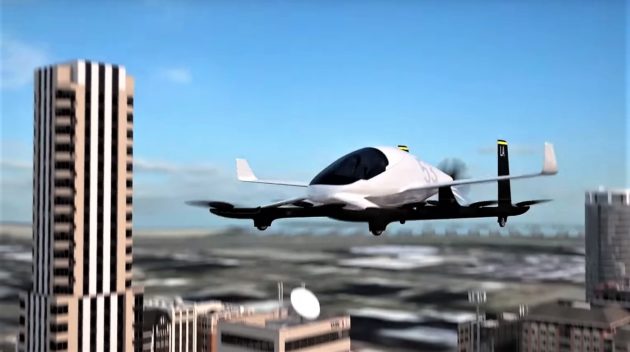
It’s not exactly a revelation that the Boeing Co. is interested in autonomous flight, including robo-planes that can fly people. But in a Bloomberg News interview, Boeing’s CEO says air taxis could be coming sooner than expected.
“I think it will happen faster than any of us understand,” Dennis Muilenburg, who also serves as Boeing’s president and chairman, told Bloomberg in last week’s interview. “Real prototype vehicles are being built right now. So the technology is very doable.”
The timetable for technology adoption will depend on how quickly regulators work out the “rules of the road” for autonomous flight, he said.
Fleets of air taxis could well become commonplace within a decade, Muilenburg said, but he cautioned that “it won’t be all turned on in one day.”
Boeing has plenty of dials it can use to turn on the technology gradually:
- For years, a Boeing subsidiary called Insitu has been providing winged drones for military applications, wildfire monitoring and emergency response.
- Last year, Boeing acquired Aurora Flight Sciences, a Virginia-based company that’s working with Uber to develop a new type of electric-powered autonomous aircraft for passenger transport. Aurora’s air taxis could begin demonstration flights as early as 2020. (Muilenburg’s forecast of regular air-taxi flights within a decade echoes the outlook from Uber CEO Dara Khosrowshahi.)
- Also last year, Boeing unveiled a prototype autonomous plane that’s designed to refuel fighter jets in midflight. It’s one of the offerings being considered in competition for a U.S. Navy contract.
- Boeing’s HorizonX venture capital arm has invested in a couple of startups that could play a role in the air-taxi market, including Kirkland, Wash.-based Zunum Aero, which is developing a regional-class, electric-powered jet; and Pittsburgh-based Near Earth Autonomy, which is working on navigation systems for autonomous flight.
Boeing executives say the company is well into developing the technologies that could smooth the way toward autonomous passenger flight. Boeing’s ecoDemonstrator program, for example, is working toward a series of fly-by-wire tests next year.
“You could imagine auto-takeoff, auto-taxi, things like that nature on a 787 – not, obviously, in a certified environment, but with an experimental ticket,” Mike Sinnett, vice president of product development at Boeing Commercial Airplanes, told journalists last June.
Boeing is by no means the only aerospace company pushing toward autonomous flight: Its European archrival, Airbus, is also pursuing several initiatives in the field – including, most notably, its investment a Silicon Valley venture called Vahana.
Vahana conducted the first flight test of its AlphaOne electric-powered air taxi a little more than a month ago in eastern Oregon, and is aiming to have a “productizable demonstrator” ready by 2020. In an unusual twist, Boeing-backed Near Earth Autonomy is a supplier for Airbus-backed Vahana.
Other flying car ventures include Joby Aviation (which just reported a $100 million investment round), Bell Helicopter (which, like Aurora, is an Uber technology partner), Terrafugia, VerdeGo Aero, Kitty Hawk, China’s EHang, Switzerland’s Passenger Drone, Germany’s Volocopter and Lilium, Slovakia’s AeroMobil and Japan’s Cartivator Project.
Not everyone is gung-ho about air taxis: Elon Musk, the billionaire CEO of SpaceX and Tesla, has repeatedly questioned whether they’d be safe enough for passenger transport.
“If you love drones above your house, you’ll really love vast numbers of ‘cars’ flying over your head that are 1,000 times bigger and noisier and blow away anything that isn’t nailed down when they land,” he tweeted sarcastically last month.
So it sounds as if flying cars could be another agenda item for a Musk-vs.-Muilenburg debate, adding to the argument over whose rocket will get to Mars first.



